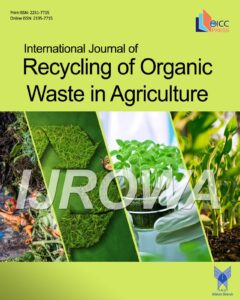The role of chemical amendments on modulating ammonia loss and quality parameters of co‑composts from waste cocoa pods
Authors
Abstract
Purpose Nitrogen loss as ammonia (NH3) in a waste cocoa pod co-composting process was determined following the addition of three potential chemical amendments that could lower NH3 loss. Further, amended compost products were assessed for quality and possible phytotoxicity in a pot experiment.
Method Pod borer damaged cocoa pods were co-composted in lab-scale vessels under ambient conditions with double superphosphate, phosphoric acid, and gypsum at 2%, 5% and 1% of fresh weight, respectively. NH3 emitted during composting was trapped in standard H2SO4 and determined titrimetrically. Composting mixtures were sampled on days 0, 7, 56 and 90 to monitor pH, total C, total N, and C:N ratio. Mature co-composts were incorporated to the soil at 20 t ha−1 and growth response of Chinese cabbage plants (Brassica rapa chinensis) assessed for the phytotoxicity.
Results The chemical amendments were ineffective (p > 0.05) in preventing loss of NH3 but the quality of composting mixtures were significantly (p < 0.0001) improved. The manure compost generated had acceptable parameters (C, 31.2–31.9% and C:N ratio, 9–10:1) and were free from phytotoxicity for soil application as revealed by the response of Chinese cabbage crop.
Conclusion Chemical amendments used in the co-composting process mainly modulated pH without any detrimental effects on quality. The results also demonstrated that the NH3 loss is insignificant from the cocoa waste-composting process. Further studies are required with increased rates of acidifying amendments like phosphoric acid to further augment the quality of cocoa pod composts.



